Beijing Normal University
Beijing Normal University (BNU, simplified Chinese: 北京师范大学; traditional Chinese: 北京師範大學; pinyin: Běijīng Shīfàn Dàxué), colloquially known as Beishida (北师大), is a public research university located in Beijing, China, with a strong emphasis on basic disciplines of the humanities and sciences. It is one of the oldest and most prestigious universities in China, and was recognized by the Chinese Ministry of Education as a Class A Double First Class University.[3] BNU is often ranked no.1 among Chinese universities in Education according to the most recent QS World University Rankings by Subjects[4] and Academic Ranking of World Universities by Subjects.[5]
北京师范大学 | |
 | |
| Latin: Universitas Normalis Pechinum | |
| Motto | 学为人师,行为世范[1] |
|---|---|
Motto in English | Learn, so as to instruct others; Act, to serve as a model for all.[2] |
| Type | Public |
| Established | 1902 |
| President | Dong Qi (董奇) |
Academic staff | Over 3,086 |
| Students | Over 24,700 |
| Undergraduates | 10,260 |
| Postgraduates | 12,891 |
| Address | 19 Xinjiekou Wai Street, HaiDian District zipcode 100875 , , People's Republic of China |
| Campus | Urban, 738,779 m2 (7,952,150 sq ft) |
| Website | Chinese Version English Version |
The name "normal school" refers to an institution that aimed to train schoolteachers in the early 20th century. This terminology is preserved in the names of such institutions in China even after these schools later developed into comprehensive universities. It also reflects BNU's heritage as a former unit of the Faculty of Education in the Imperial University of Peking.
History
The University grew out of the Faculty of Education at the Imperial University of Peking which was established as China's first modern university, on the initiative of the emperor of the Qing Dynasty after the Hundred Days' Reform in 1898. In 1908 the Faculty of Education was named the "Imperial Capital School of Supreme Teacher Training" and was separated from the Imperial University of Peking, which subsequently became Peking University.
After the Republic of China was established, the Imperial Capital School of Supreme Teacher Training was renamed Peking Normal College in 1912. The college established its first graduate programs in 1920 and began to recruit female students in 1921. In 1923 it was renamed as Peking Normal University, thus becoming the first normal university in modern Chinese history. The Peking Women's College of Education merged into Peking Normal University in 1931.
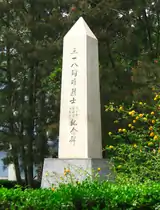
When the Communist Party established the People's Republic of China in 1949, the capital of Peking was reromanized via pinyin in spelling as Beijing and the university was consequently renamed Beijing Normal University. During a national initiative of university rearrangement in 1952, Fu Jen Catholic University merged with Beijing Normal University. In 1954, BNU moved from its Hepingmen campus to a newly established campus at Beitaipingzhuang and has remained there since.
Historically, students at Beijing Normal University have played major roles in patriotic, democratic and other social movements, including the May Fourth Movement in 1919, the Cultural Revolution, and the Tiananmen Square protests of 1989. The New York Times has described it as "one of the most progressive institutions" in China.[6] During the Cultural Revolution, Beijing Normal University students made up much of the student-led Red Guard, which killed thousands of people and attempted to destroy what they saw as "outdated" and "backwards" artifacts and cultural institutions.[7][8]
Present
Beijing Normal University was selected to be a Project 211 institution in 1996. In 2002, BNU signed an agreement with the Ministry of Education and Beijing municipal government to become the 10th university participating in Project 985, through which it receives special support from the Chinese government aimed at elevating its reputation to the level of a "world-class" university.[9]
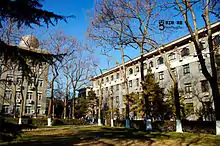
During its centennial celebration in 2002, an asteroid discovered in 1996 was named after the university as 8050 Beishida.
After a special visit by Premier Wen Jiabao to the university on May 4, 2006, the Chinese government implemented a tuition-waiver policy for teacher training programs in six normal universities that are supervised by the Ministry of Education, including Beijing Normal University.
The university also has a strong emphasis on increasing educational equity. Its 2009 demographic data shows that 40% of its enrolled students were from western China, almost one third were from rural areas, and a quarter were from low-income families. Ethnic minorities comprised more than 10% of students.[10]
Academics
As of the year 2020, the university has 74 undergraduate degree programs, 185 master programs, and 142 doctoral programs. 16 of them are honored as "national key disciplines", including 5 general disciplines and 11 specialized disciplines, and are recognized as among the top ranked programs in China:
| National Key Disciplines at Beijing Normal University | |
|---|---|
| Education | Psychology |
| Chinese Language and Literature | Mathematics |
| Geography | Cell Biology |
| Marxist Philosophy | Physical Chemistry |
| Ancient Chinese History | System Sciences |
| Theory of History | Theoretical Physics |
| Folklore/Anthropology | Environmental Science |
| Ecology | Educational Economics and Management |
Beijing Normal University possesses 74 research laboratories, including 4 National Key Labs, 7 Key Labs of the Ministry of Education, and 5 Key Labs of the Beijing Municipality. Key research centers and facilities include 7 key research facilities in humanities and social sciences of the Ministry of Education, 2 research centers of Engineering and Technology of the Beijing Municipality, 3 research centers jointly established with the Beijing Municipality, and more than 40 other research centers. Additionally, the university has an institute dedicated to Proteomics, the only one established in a university by the Ministry of Education. The university has also established a Science Park comprising 6 hectares.
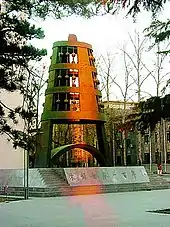
Beijing Normal University's annual research budget in the sciences exceeds RMB 100 million. In 2010, 150 projects were funded by the National Natural Science Foundation, with a record high amount of RMB 62 million (compared with 44.7 million in 2009 and 37 million in 2007).[11]
Funding for research in the humanities and social sciences has increased rapidly in the last five years to RMB 150 million, the third largest budget nationally. Since 2002, the annual increase in budget has been over RMB 30 million, equating to RMB 40,000 per capita. This increase in funding reflects BNU's institutional commitment to basic theory and research in the humanities and social sciences.
Beijing Normal University was also among the first Chinese institutions to recruit international students. It is particularly popular for its Mandarin Chinese study programs. Among its most prestigious programs is Princeton in Beijing, a collaboration with Princeton University in the United States.[12]
Regarding international co-operation, the Beijing Normal University is part of a university consortium (together with the Danube University Krems, the University of Applied Sciences Osnabrück and the University of Tampere) which offers an Erasmus+ joint master's degree, a Master in Research and Innovation in Higher Education.
Collaboration with SUSS
The University collaborates with the Singapore University of Social Sciences (SUSS) on SUSS's Master of Arts in Chinese Language and Literature.[13]
Rankings and reputation
| University rankings | |
|---|---|
| Global – Overall | |
| ARWU World[14] | 200-300 (2020) |
| QS World[15] | 279 (2021) |
| THE World[16] | 301–350 (2021) |
| THE Reputation[17] | 176-200 (2020) |
| USNWR Global[18] | 320 (2021) |
| Regional – Overall | |
| QS Asia[19] | 51 (2021) |
| QS BRICS[20] | 27 (2019) |
| THE Asia[21] | 45 (2020) |
| THE Emerging Economies[22] | 24 (2020) |
| USNWR Asia[23] | 48 (2021) |
| National – Overall | |
| BCUR National[24] | 22 (2019) |
| QS National[25] | 12 (2021) |
| THE National[26] | 10 (2021) |
In 2020, BNU was ranked 25th[27] and 29th[28] globally in the QS World University Rankings by Subjects and the Times Higher Education Rankings by Subjects for "Education and Training" respectively, which are historical strengths for the Faculty of Education that originated as a "normal university".
Global University Rankings of BNU:
- QS World University Ranking : 279nd, 12th in China[29]
- Academic Ranking of World Universities : 201-300th, 7th-12th in China[30]
- Times Higher Education World University Rankings : 301–350th, 10th in China[31]
Schools and Departments
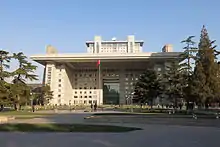
- Faculty of Education[32]
- School of Chinese Language and Literature[33]
- School of Law
- School of Economy and Business Administration
- School of Foreign Language and Culture[34]
- School of Life Science
- School of Chemistry
- School of Resources[35]
- School of Geography
- Department of Astronomy[36]
- School of Mathematics
- School of History
- School of Philosophy
- Department of Physics
- School of Systems Science[37]
- School of Psychology[38]
- School of Social Development and Public Policy[39]
- School of Arts and Mass Media
- School of Environment
- School of Sociology
Beijing Normal University also has many other areas of study not mentioned above.
Campus
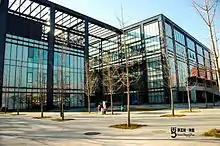
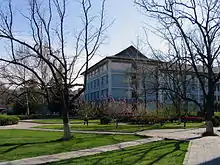
The main campus is in Haidian District,[40] with other Beijing campuses in Changping District and Xicheng District as well as a campus in Zhuhai, Guangdong.[41]
The original campus was near Hepingmen and Liulichang in the center of Beijing during the Republic of China period, and after Fu Jen University merged into BNU, the Fu Jen's campus near Shichahai and Prince Kung's Mansion became the Northern Campus of BNU.
Beijing Normal University's current campus was built in 1954. It is located in central northwest Beijing in Haidian district, between the second and third ring roads, and is the closest of all Haidian universities to Tiananmen Square, site of the 1989 Tiananmen Square protests during which several BNU students were involved as student leaders.
BNU's campus hosted the U.S. Olympic Team during the 2008 Beijing Olympics.[42][43]
Notable alumni
- Mo Yan, writer, 2012 Nobel Literature Prize laureate
- Liu Xiaobo, writer and dissident, 2010 Nobel Peace Prize laureate
- Su Tong, novelist
- Cao Shui, poet, novelist and screenwriter
- Xie Jun, chess grandmaster
- Zhu Jin, astronomer
- Lang Ping, gold medalist in 1984 Summer Olympics women's volleyball, and former head coach of the U.S. women's national volleyball team
- Dao Youhe, well-known specialist in Chinese education
- Chen Yibing, gymnast, 2008 Summer Olympics and 2012 Summer Olympics gold medalist
- Xu Jialu, professor of Chinese, politician, and former vice chairman of the National People's Congress
- Yuan Guiren, professor of philosophy, and the former Minister of Education of the People's Republic of China
- Sun Siwei, well-known specialist in Chinese education
- Yu Dan, professor well known for her popular and controversial lectures about the Analects broadcast on China Central Television
- Ye Ding, psychologist
- Weidong Li, professor of astronomy, the first Chinese astronomer to discover a supernovae since 1054 A.D.[44]
- Min Weifang, former CPC Secretary of Peking University, serving from 2002 to 2011. He is a graduate of the Education Department, subsequently earning his Ph.D. from Stanford University in the United States
- Wang Dezhao or Ouang Te Tchao, prominent Chinese physicist, academician of the Chinese Academy of Sciences, student of French physicist Paul Langevin and founder of underwater acoustics in China, Officier of the French National Order of the Legion of Honour.
- Wang Xiaodong, elected member of the United States National Academy of Sciences, former biochemist at the University of Texas Southwestern Medical Center, and currently Director and Investigator at the National Institute of Biological Sciences, Beijing (NIBS, Beijing)
- Timothy Geithner, 75th United States Secretary of the Treasury. He attended as a language student studying Mandarin in 1982 as an undergraduate at Dartmouth College.[45]
- Kirsten Gillibrand, United States Senator from New York. She attended as an undergraduate in Dartmouth College's FSP program.[46]
Affiliated high schools
See also
References
- "北京师范大学简介". Beijing Normal University. Archived from the original on June 29, 2014. Retrieved June 24, 2014.
- "Beijing Normal University". English Home Page. Beijing Normal University. Retrieved May 28, 2014.
- "教育部 财政部 国家发展改革委 关于公布世界一流大学和一流学科建设高校及建设 学科名单的通知 (Notice from the Ministry of Education and other national governmental departments announcing the list of double first class universities and disciplines)".
- "Education". Top Universities. 2020-02-25. Retrieved 2020-10-02.
- "ShanghaiRanking's Global Ranking of Academic Subjects 2020 - Education | Shanghai Ranking - 2020". www.shanghairanking.com. Retrieved 2020-10-02.
- Wines, Michael (2 November 2009). "China Dismisses Minister of Education" – via NYTimes.com.
- Ma, Aiping; Si, Lina; Zhang, Hongfei (2009), "The evolution of cultural tourism: The example of Qufu, the birthplace of Confucius", in Ryan, Chris; Gu, Huimin (eds.), Tourism in China: destination, cultures and communities, Routledge advances in tourism, Taylor & Francis US, p. 183, ISBN 978-0-415-99189-6
- "Asiaweek article". Asiaweek. 3 January 1984 – via Google Books.
- "Archived copy". Archived from the original on 2010-12-18. Retrieved 2010-10-11.CS1 maint: archived copy as title (link)
- "钟秉林谈师范生教育:毕业生已供大于求(图)". Retrieved 18 July 2015.
- "Archived copy". Archived from the original on 2010-10-30. Retrieved 2010-10-26.CS1 maint: archived copy as title (link)
- "PRINCETON in BEIJING -". www.princeton.edu.
- "Collaborations with Overseas Universities". SUSS. 29 May 2018. Archived from the original on 29 May 2018. Retrieved 29 May 2018.
- "ARWU World University Rankings 2020 - Academic Ranking of World Universities 2020 - Top 1000 universities - Shanghai Ranking - 2020". Shanghairanking.com.
- "QS World University Rankings 2021".
- "World University Rankings 2021". Time Higher Education. 2020-09-02. Archived from the original on 2020-09-02. Retrieved 2020-09-02.
- "THE Reputation World University Rankings 2020".
- "US News World University Rankings 2021".
- "QS University Rankings: Asia 2021". Retrieved 29 November 2020.
- "QS University Rankings: BRICS 2019". Top Universities.
- "THE Asia University Rankings".
- "THE Emerging University Rankings 2020".
- "US News Asia University Rankings 2021". Retrieved 29 November 2020.
- "Overall Ranking, Best Chinese Universities Rankings - 2019". www.shanghairanking.com.
- "QS Mainland China University Rankings".
- "THE Chinese University Rankings" – via Wikipedia.
- "BNU Faculty of Education Ranks 25th in the QS World University Rankings by Subject 2020 -Faculty of Education Beijing Normal University". fe.english.bnu.edu.cn. Retrieved 2020-09-29.
- "World University Rankings 2021 by subject: education". Times Higher Education (THE). 2020-10-26. Retrieved 2020-10-28.
- "Beijing Normal University Rankings". Top Universities. Retrieved 29 September 2020.
- "World University Rankings - 2014 - China Universities in Top 500 universities - Academic Ranking of World Universities - 2014 - Shanghai Ranking - 2014". Retrieved 18 July 2015.
- "Beijing Normal University". Times Higher Education (THE). 2020-09-18. Retrieved 2020-09-29.
- "Faculty of Education - BNU". Retrieved 18 July 2015.
- "Beijing Normal University". Retrieved 18 July 2015.
- "北京师范大学外国语言文学学院". www.sfll.bnu.edu.cn.
- "Archived copy". Archived from the original on 2012-01-02. Retrieved 2011-12-27.CS1 maint: archived copy as title (link)
- "Department of Astronomy, Beijing Normal University - 北京师范大学天文系". Retrieved 18 July 2015.
- "北京师范大学系统科学学院". sss.bnu.edu.cn.
- 北京师范大学心理学部. "北京师范大学心理学部". psych.bnu.edu.cn.
- "Archived copy". Archived from the original on 2012-01-02. Retrieved 2011-12-27.CS1 maint: archived copy as title (link)
- "Home". Beijing Normal University. Retrieved 2020-08-17.
No.19, Xinjiekouwai St, Haidian District, Beijing, 100875, P.R.China
- "Campuses". Beijing Normal University. Retrieved 2020-08-17.
- US Olympians Train at Beijing Normal University. YouTube. 21 August 2008. Retrieved 18 July 2015.
- "Archived copy". Archived from the original on 2009-04-29. Retrieved 2010-10-13.CS1 maint: archived copy as title (link)
- "Dr Filippenko's Dedication of his SJAA Talk - SJAA". SJAA. Retrieved 18 July 2015.
- "Remarks at the Central Party School Treasury Secretary Tim Geithner Beijing, China As Delivered". www.treasury.gov.
- Cross, Ester. "Folt celebrates Beijing Normal University partnership". The Dartmouth. Archived from the original on November 9, 2012. Retrieved January 6, 2013.